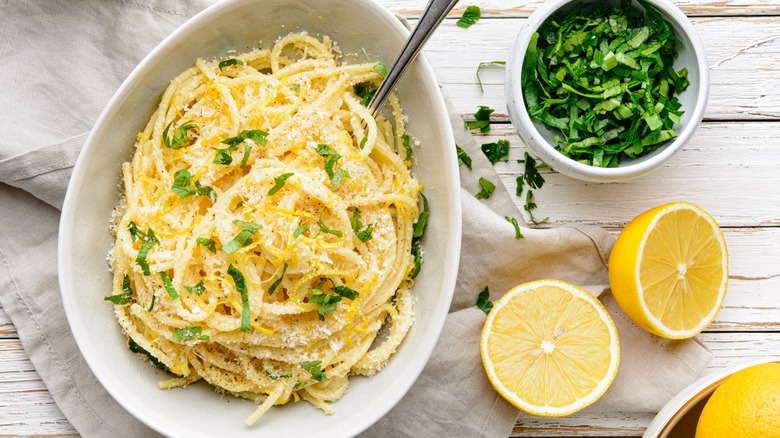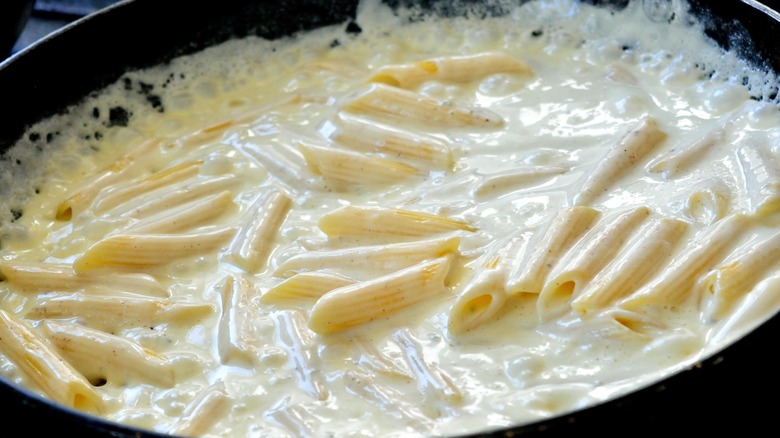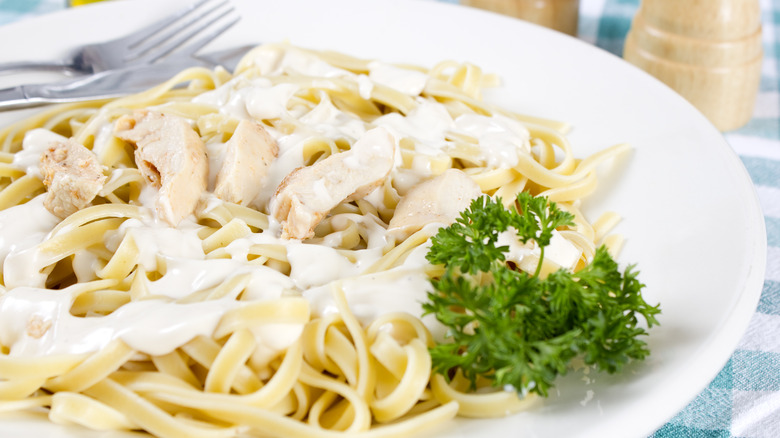Thicken Your Pasta's Cream Sauce With One Staple Fruit
A thick, nurturing sauce is the perfect pairing for just about any shape of pasta. But from your favorite creamy chicken Alfredo to an equally creamy Parmesan sauce over rotini, there's one ingredient you may not be expecting to see in the recipe — especially since it comes from the fruit bowl. The juice from a lemon serves as a thickener for creamy sauces, and it also lightens the flavors of the dish.
Fortunately, these fruits are something most of us commonly have on hand — especially since lemons can last a month or more if properly stored. While we all know they are great for making Lemon Drop Martinis and adding zing to a wide variety of dishes, you may not be aware that they can also be the answer to an overly thin pasta sauce. While the science behind it is a bit complicated, the simple truth is that the acid from the bright citrus fruit initiates a reaction in cream that causes it to thicken, creating a comforting embrace for your pasta.
The lemon and cream relationship explained
When lemon juice is added to warmed cream, it doesn't directly thicken in the same way as a roux. Instead, it changes the proteins inside the cream, which in turn increases its viscosity. The proteins undergo a process called denaturing, in which the bonds within them break. New bonds then form, coagulating and increasing surface hydrophobicity. That's a science-y way of saying that the proteins trap water inside and become insoluble. As it pertains to your pasta sauce, adding lemon juice to warmed cream causes the proteins to expand as they lock in moisture, which creates a thicker sauce.
Without knowing it, you've likely seen the results of this process many times over. It's the same technique used when mixing lemon juice with cream to make a posset. It's also the same reaction that takes place when vinegar and milk turn into buttermilk, or when adding lemon juice to milk "curdles" it for use as a starter for yogurt. While curdling sounds like a bad thing, it's basically just the act of encouraging those proteins to clump together. The fat in the cream, however, keeps it from getting lumpy like cottage cheese or sour milk, instead resulting in a thick, creamy finish.
Other sauce thickening tips
When making a cream sauce for your pasta, pay attention to the type of cream you're using. Heavy cream, light whipping cream, and double cream are not the same thing. At the lighter end of the spectrum, you'll find whole milk, buttermilk, and half and half. These all contain less than 12% fat. Light cream, or single cream, usually lands around 18% fat, while heavy cream contains at least 36% fat.
You may also see double cream or crème fraîche, which both crank the fat content up to around 48%. However it's labeled, use a cream that's at least 30% fat if you plan to employ this lemon juice hack, or the lemons' acidity may cause the cream to curdle excessively. Of course, you can always rely on the standby thickener of roux for your pasta sauce, even if it doesn't offer a boost of brightness like lemon juice does.
Roux can be used as a flour/fat combination at the beginning of the cooking process, or prepared and incorporated as a thickening agent once the cream has been added. One final tip to consider: You can also thicken your pasta sauce with the water you cooked your noodles in, which is one of many great uses for leftover pasta water. As the noodles cook, they release starches into the water. In turn, that starchy water acts as a thickener for your sauce. Combined with a splash of lemon juice, cream, and cheese, you'll have a thick, creamy pasta sauce begging to be eaten.


